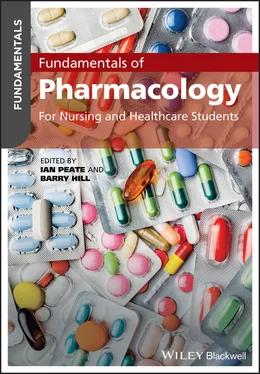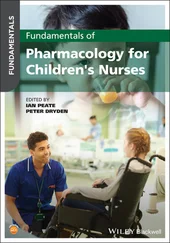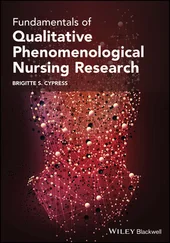The Code sets out in detail the professional standards that nurses must uphold and all nurses, regardless of setting, are required to align their practice and behaviour to the Code. The values and principles that are set out in the Code are not negotiable or discretionary.
All nurses will exercise professional judgment in their work as they offer care to people, including the care that is associated with medicines and medicines management: each nurse is accountable for their actions and omissions. Nurses are required to uphold the Code within the limits of their competence associated with the contribution they make to overall care provision. Practising within your sphere of competence and your scope of practice is key to the underpinning principle of the Code – to protect the public – and must be upheld at all times.

Figure 1.2 The Code. Source: Olympus America, Inc. With permission.
The Code is made up of a series of statements that taken together imply what good practice looks like. It makes clear that the interests of patients and service users come first, that care is safe and effective and that it promotes trust through professionalism (see Figure 1.2).
Clause 18 of the Code is specifically related to medicines. Nurses are required to advise on, prescribe, supply, dispense or administer medicines that are within the limits of their training and competence, the law, and in relation to NMC guidance and other relevant policies, guidance and regulations. In order to do this, the nurse must:
Prescribe, advise on, or provide medicines or treatment, including repeat prescriptions (only if the nurse is suitably qualified) if the nurse has enough knowledge of that person's health and is satisfied that the medicines or treatment serve that person's health needs.
Adhere to appropriate guidelines when providing advice on using controlled drugs and recording the prescribing, supply, dispensing or administration of controlled drugs.
Ensure that the care or treatment that the nurse advises on, prescribes, supplies, dispenses or administers for each person is compatible with any other care or treatment that the person is receiving, including (where possible) over‐the‐counter medicines.
Take all steps to keep medicines stored securely.
Wherever possible, avoid prescribing for yourself or for anyone with whom you have a close personal relationship.
It should be noted that prescribing is not within the scope of practice of everyone on the NMC register. Nurses who have successfully completed a further qualification in prescribing and recorded it on the NMC's register are the only people on the register that can prescribe.
The Nursing and Midwifery Council's Standards of Proficiency
In 2018, the NMC published future nurse proficiencies for registered nurses (NMC, 2018b) and for nursing associates (NMC, 2018b) along with a range of other revised and updated standards. The standards of proficiency provide the education and training standards that underpin all aspects of nurse education delivery and management.
The standards make significant changes to proficiencies for nurses, introducing a new education framework. The standards of proficiency are designed to enable nurses to meet the changing health needs of the population, to provide them with more clinical autonomy where appropriate, and to prepare them for leadership roles in the sphere of care provision ensuring the nurse is fit for purpose. The standards are based on the following requirements (platforms) to:
be an accountable professional;
promote health and prevent ill health;
assess needs and plan care;
provide and evaluate care;
lead and manage nursing care and work in teams;
improve safety and quality of care;
coordinate care.
As well as understanding the principles of safe and effective administration and optimisation of medicines and adhering to local and national policies, the nurse must also demonstrate proficiency and accuracy when they are calculating dosages of prescribed medicines. The nurse has to demonstrate knowledge of pharmacology and the ability to recognise the effects of medicines, allergies, drug sensitivities, side effects, contraindications, incompatibilities, adverse reactions, prescribing errors and the impact of polypharmacy – and also over‐the‐counter medication usage. See Table 1.1for the procedural competencies for nurses (registered and associate) that are essential for best practice, evidence‐based medicines administration and efficacy.
Table 1.1 Registered nurse procedural competencies and the procedural competencies required by the nursing associate
Source: Adapted, NMC (2018b).
| The registered nurse |
The nursing associate |
| Undertake initial and continued assessments of people receiving care and their ability to self‐administer their own medications.Understand the various procedural routes under which medicines can be prescribed, supplied, dispensed and administered; and the laws, policies, regulations and guidance that underpin them.Make use of the principles underpinning safe remote prescribing and directions for the administration of medicines.Undertake accurate drug calculations for a variety of medications.Undertake accurate checks, including transcription and titration, of any direction to supply or administer a medicinal product.Apply professional accountability so as to ensure the safe administration of medicines to those who are receiving care.Administer injections using intramuscular, subcutaneous, intradermal and intravenous routes and manage injection equipment.Administer medications using a range of routes.Administer and monitor medications using vascular access devices and enteral equipment.Recognise and respond to adverse or abnormal reactions to medications.Undertake safe storage, transportation and disposal of medicinal products. |
Continually assess people who are receiving care and their ongoing ability to self‐administer their own medications.Know when and how to escalate any concerns.Perform accurate drug calculations for a variety of medications.Use professional accountability in order to ensure the safe administration of medicines to those receiving care.Administer medication via oral, topical and inhalation routes.Administer injections using subcutaneous and intramuscular routes and manage injection equipment.Administer and monitor medications using enteral equipment.Administer enemas and suppositories.Manage and monitor effectiveness of symptom relief of medications.Recognise and respond to adverse or abnormal reactions to medications and know when and how to escalate any concerns.Undertake safe storage, transportation and disposal of medicinal products. |
Medicine management and standards
Nurses and health and social care staff often manage medicines on behalf of those people who use their services. It is a requirement of care providers to promote the safe and effective use of medicines. If healthcare organisations fail to do this, the Care Quality Commission (CQC) (2018) suggest that this poses real risks to people who may be vulnerable, including:
older people;
people with reduced mental capacity, reduced mobility or a sensory impairment;
people who rely on help to take their medicines.
Medicine management standards provide nurses with a framework for safe practice. All nurses must read and comply with these standards, and undergraduate students must also be familiar with them. The requirements laid out in the various standards consider issues essential for the safe management of all medications and also include controlled drugs.
Читать дальше













